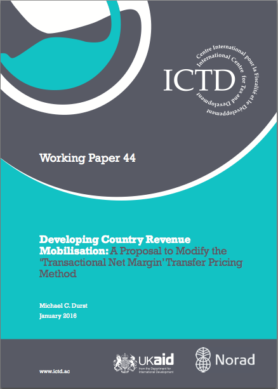ICTD Working Paper 44
Developing countries tend to rely more heavily than wealthier countries on corporate tax revenue from multinational companies operating in their jurisdiction. Therefore, the practice that the Organisation for Economic Cooperation and Development (OECD) has labelled ‘base erosion and profit shifting’ (BEPS) – the diversion of taxable income by multinational groups from countries where they conduct business to other, zero- and low-tax countries – poses an especially challenging problem for developing countries.
Some of developing countries’ vulnerability to BEPS stems from the manner in which the Transactional Net Margin Method (TNMM), a particular transfer pricing method (method for dividing the income of a multinational group among the countries where the group operates), which is permitted under OECD guidelines, is currently being applied in practice. This paper argues that developing countries might be made less vulnerable to profit shifting if the OECD modifies TNMM in several respects. In particular, this paper suggests that: (i) the current dependence of TNMM on searches for ‘uncontrolled comparables’ be replaced by benchmarking based on the global profitability of the taxpayer’s multinational group; and (ii) the accounting rules used under TNMM be changed, so that the method is capable of reducing profit shifting through payment of interest on loans from affiliates, as well as from other kinds of related-party transactions.
As a first step in considering these proposals for implementation, the OECD and perhaps other international organisations will need to work with national tax administrations in order to develop reasonable estimates of the likely revenue effects. In addition, as a political matter, adoption of the suggested changes to TNMM will require multinational companies, and the governments that represent their interests, to be willing to exercise a degree of restraint in their tax policymaking in favour of the fiscal interests of developing countries. If that restraint is forthcoming, however, and revenue estimates prove encouraging, then changes to TNMM along the lines suggested below might contribute to worthwhile improvements in the current North/South fiscal balance.

